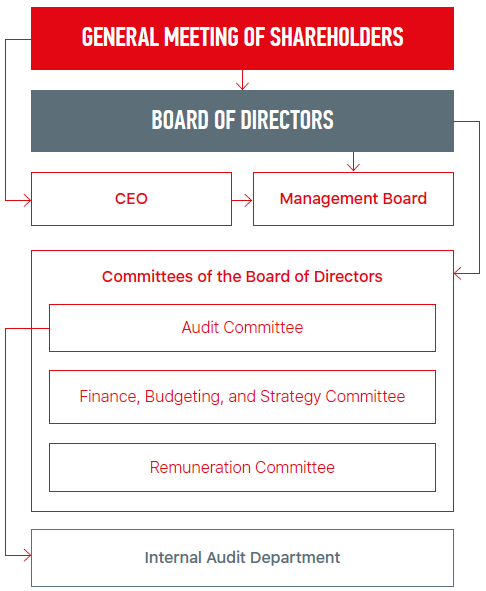Corporate Governance
The Company’s effective corporate governance system serves as the foundation for building trust-based relationships with shareholders, investors, employees, and other stakeholders, which provides a major contribution to the Company achieving its sustainable development goals.
Corporate Governance Structure
102-18
Metalloinvest’s main corporate governance bodies are the General Meeting of Shareholders, the Board of Directors, the Management Board (collective executive body), and the CEO.
The General Meeting of Shareholders is the Company’s highest governing body.
The General Meeting of Shareholders elects members of the Board of Directors – a collective body that handles the day-to-day management of the Company’s activities and determines its corporate development strategy. The Board of Directors’ main role is to create conditions for the Company’s sustainable development through a regular review of its strategic priorities. The Company’s sustainable development objectives are determined at the level of the Management Board, which is chaired by the CEO.

102-22
As of 31 December 2018, the Board of Directors was comprised of eight members, three of whom were recognised as independent:
-
102-23
- Ivan Streshinsky, Chairman of the Board of Directors, Non-Executive Director
- Galina Aglyamova, Independent Non-Executive Director
- Andrey Varichev, Executive Director
- Valery Kazikayev, Independent Non-Executive Director
- Gleb Kostikov, Non-Executive Director
- Irina Lupicheva, Non-Executive Director
- Pavel Mitrofanov, Non-executive Director
- Dmitry Tarasov, Independent Director
Ivan Streshinsky, who has been a member of the board since February 2013, was elected Chairman of the Board of Directors and is a member of the Remuneration Committee.
102-31
In 2018, the Board of Directors held seven meetings in person and 55 meetings in absentia where a number of major decisions were adopted concerning different areas of the Company’s activities, including business transformation and progress in achieving sustainable development. The Board paid special attention to social issues such as social projects and collaboration with secondary and higher educational institutions.
All members of the Board of Directors undergo regular performance evaluations, including in terms of managing economic, environmental, and social issues.
The Management Board serves as the Company’s collective executive body. It is comprised of the CEO, deputy CEOs, the managing directors of four enterprises as well as directors in charge of strategy, development, transformation, corporate affairs, finance, economics, and investment (11 directors in total).
102-26The Management Board is responsible for coordinating the work of the services and units of the Management Company and the Company's enterprises and adopting decisions on major issues related to day-to-day activities. In addition, the Management Board is in charge of preparing proposals for the Board of Directors on promising areas for the Company’s development and plans for their implementation and also on developing strategies and policies for economic, environmental, and social issues.
The sole executive body is the CEO, who handles the operational management of the Company’s day-to-day activities. The CEO acts on behalf of the Company and represents its interests.
102-18
Three permanent committees have been set up under the Management Company’s Board of Directors:
- Audit Committee
- Finance, Budgeting, and Strategy Committee
- Remuneration Committee
102-19
The committees under the Board of Directors conduct a preliminary review of and prepare recommendations on the most important issues within the remit of the Board of Directors, including on economic, environmental, and social matters. Certain issues related to ensuring sustainable development are submitted to the Board of Directors for review through the Committees. General approaches to resolving issues are approved by the Board of Directors, while the Management Board and the CEO ensure their implementation.
For more details on corporate governance, see the section Corporate Bodies’ Structure and Performance Results of the 2018 Annual Report (pp. 80–90).
Sustainable Development Management
The following operational committees handle sustainable development issues:
- Risk Committee
- Environment, Health and Safety Committee
102-20
At the level of the Management Company’s structural units, sustainable development activities are coordinated by the Social Policy and Corporate Communications Director, who reports directly to the CEO.
102-19
The relevant structural units of the Management Company are responsible for handling specific sustainable development tasks:
- Social Policy Department
- HR Department
- Organisational Development Department
- Security Department
- Environment, Occupational Health and Safety Division
- Health Division
- Internal Audit Department
- Corporate Communications Department
In addition to the aforementioned departments that are responsible for sustainable development at the highest level throughout the Company, production units also manage issues in this regard by handling specific tasks for each individual plant. These tasks are coordinated by special structural units that are created at each of the Company’s enterprises – Social Affairs Directorates.
Metalloinvest also has a Social Council that includes representatives of trade unions and Company employees that ensure the implementation of socially-oriented activities at the local level.
For more details on Metalloinvest’s corporate governance system, see the section Corporate Bodies’ Structure and Performance Results of the 2018 Annual Report (pp. 80–90).






